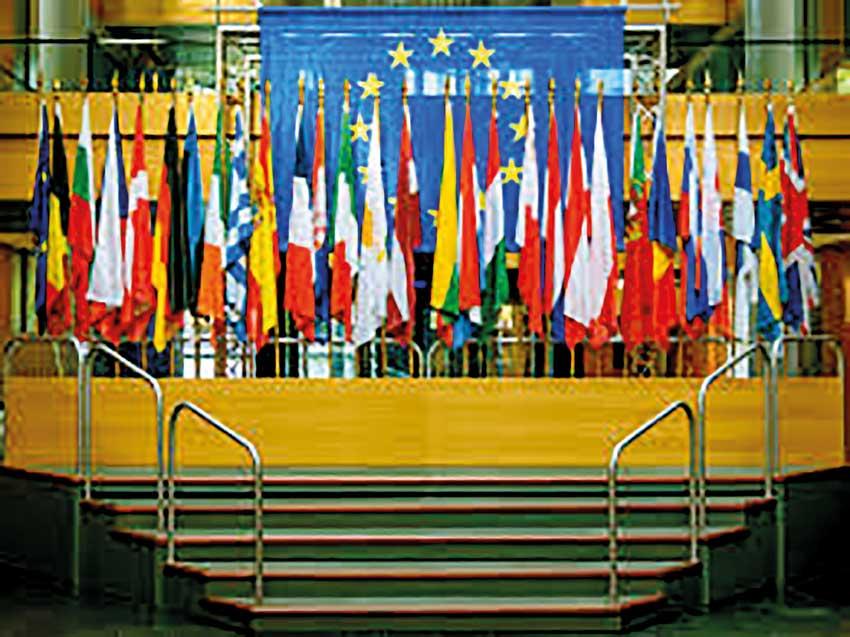18 Aug 2022 - {{hitsCtrl.values.hits}}

In his ‘The Ballad of East and West’ Rudyard Kipling put the issue of political geographies in a nutshell.
Oh, East is East, and West is West, and never the twain shall meet, Till Earth and Sky stand presently at God’s great Judgment Seat”
 Literally, yes, where one ends the other starts and apart from that common boundary there can be no overlap. On the other hand, it all depends on who gets to draw the lines and how. Where does East begin? Can such a question prompt an unequivocal answer? For decades the Berlin Wall served as a proxy for an East-West boundary. It was a line that was essentially determined by political and ideological preferences. Strictly speaking any line from the North Pole to the South could separate east from west. Whichever way you want to slice the global cake, you could, theoretically, affirm Kipling’s thesis. Or at least its first part, above.
Literally, yes, where one ends the other starts and apart from that common boundary there can be no overlap. On the other hand, it all depends on who gets to draw the lines and how. Where does East begin? Can such a question prompt an unequivocal answer? For decades the Berlin Wall served as a proxy for an East-West boundary. It was a line that was essentially determined by political and ideological preferences. Strictly speaking any line from the North Pole to the South could separate east from west. Whichever way you want to slice the global cake, you could, theoretically, affirm Kipling’s thesis. Or at least its first part, above.
Well, the East did meet the West around the year 1990. Well, the West marched eastward, quite in violation of the verbal agreement between Gorbachev and Reagan — NATO expanded and is not done yet. No wonder Putin is peeved, but that’s another story. What’s important is Kipling’s qualifier:

But there is neither East nor West, Border, nor Breed, nor Birth,
When two strong men stand face to face, though they come from the ends of the earth!
He alludes to interaction and even cross-fertilization; thesis encountering antithesis and yielding synthesis. And this has nothing to do with geography but everything to do with political geographies which include the play of power in multiple territories including that of ideology. That cake can be cut many ways. We had, for example, a longitudinal slicing: North vs. South best articulated by the liberation desire embedded in the geographical reimagining proposed by Ernesto Che Guevara, the Tri-continental. A SOUTHERN Tri-continental, really, with South Asia, Africa and South America closing ranks against a northern predator. A PROLETARIAN Southern Tricontinental, to be more accurate, for ideology and power associated with class obviously cut through this particularly imagined border.
Geographies are always in flux, even those that yield professional work for cartographers. The maps of the United States and Europe have had to be redrawn many times over the past two centuries, India didn’t have a map until the European hordes arrived, Pakistan was territorially diminished, the sun set on the British Empire and so on.
Such transformations are relevant in a world of nations and nationalisms. And yet, we live in a clubbed world. Nations come together for reasons of expediency — common enemies, security-related imperatives, ideological agreement etc. We have blocs. The Soviets, for example. NATO. G7. ASEAN. EU. SAARC. Not all things and interests are contained within boundaries; one cannot build walls around certain factors.
Geographies are always in flux, even those that yield professional work for cartographers. The maps of the United States and Europe have had to be redrawn many times over the past two centuries, India didn’t have a map until the European hordes arrived, Pakistan was territorially diminished, the sun set on the British Empire and so on
Sure there are clubs with open membership such as the UN, but then again even in such organizations and their satellite entities, other clubs with restrictions on membership operate as one and in opposition to the general membership. They are not flat, these seemingly all-encompassing bodies. Scratch the avowed egalitarian surface and you find tribalism and the continuous affirmation of power-truths. Example? UNHRC, the North America - EU bloc and pernicious browbeating of Sri Lanka. If you want to talk about overarching processes then interject the word ‘capital’ and the entire edifice starts to look like a circus.
But let’s get less abstract for now. Let’s pose some questions. Is Australia in the West or East, is it an island in the North or South? Is India in South Asia or is it for all intents and purposes the local bullyboy or the global bullyboy? Will India remain ideologically and politically in the laps of North America, Europe and all the sick-man nations therein well into the future? Will that recently-named country, relatively speaking, recognize it true potential need not stop at servitude in a century where the balance of power has shifted dramatically East (or West, depending on how you want your world map drawn) or to be precise away from North America and Europe? Is it only about territory? Isn’t there a possibility of one tyrannical bloc replacing another in these tectonic shifts of economic and political sway?
Roy Sawh, the eloquent Hyde Park orator spoke to the issue of mis-cartography decades ago: ‘Hong Kong, so close to China and so far away from Britain is a British colony; Northern Ireland, so close to Southern Ireland is part of Britain; the Falkland Islands, so close to Argentina and so far away from Britain, is part of Britain; England, so close to Europe and so far away from America is another state of the United States.’
What’s valid for the world is valid for nations too. There are countries within countries, claims within claims and nations that await independence from tyrannies geographical and otherwise; nations that need to be emancipated from tyrannical temporalities and preferences dictated by notions of ‘the right now.’
In these nations reside nationalists who, strangely, have more things common with nationalists resident in other nations geographically far removed. If there are clubs and blocs for tyrants and if members-limited cartels exist to arm-twist, subjugate and extract, then there can be solidarities between peoples empowered by the resolve not to inhabit versions of their realities scripted by oppressors of all kinds.
Sound optimistic and utopian? Perhaps. Shouldn’t stop nations and nationalists therein to cut through the deceit of description and the subterfuge of political cartographers. The ballad that describes the relevant heroics and unpacks political geographies, I’m sure, will not be written by a Kipling but someone with true epistemic privilege.
[email protected]
27 Nov 2024 15 minute ago
27 Nov 2024 54 minute ago
27 Nov 2024 1 hours ago
27 Nov 2024 1 hours ago
27 Nov 2024 1 hours ago